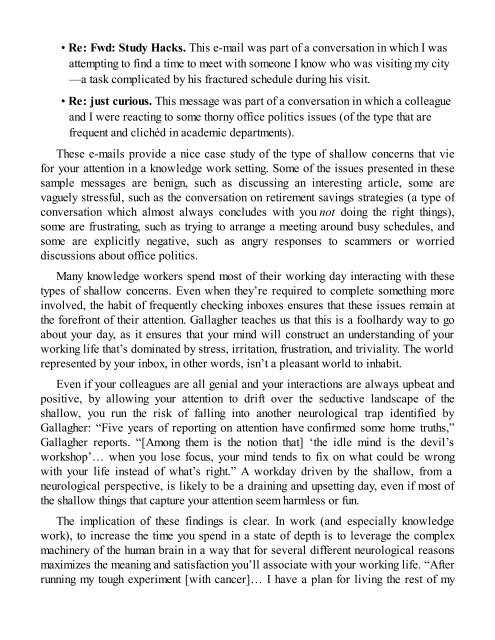Deep Work_ Rules for focused success in a distracted world ( PDFDrive.com )
You also want an ePaper? Increase the reach of your titles
YUMPU automatically turns print PDFs into web optimized ePapers that Google loves.
• Re: Fwd: Study Hacks. This e-mail was part of a conversation <strong>in</strong> which I was<br />
attempt<strong>in</strong>g to f<strong>in</strong>d a time to meet with someone I know who was visit<strong>in</strong>g my city<br />
—a task <strong>com</strong>plicated by his fractured schedule dur<strong>in</strong>g his visit.<br />
• Re: just curious. This message was part of a conversation <strong>in</strong> which a colleague<br />
and I were react<strong>in</strong>g to some thorny office politics issues (of the type that are<br />
frequent and clichéd <strong>in</strong> academic departments).<br />
These e-mails provide a nice case study of the type of shallow concerns that vie<br />
<strong>for</strong> your attention <strong>in</strong> a knowledge work sett<strong>in</strong>g. Some of the issues presented <strong>in</strong> these<br />
sample messages are benign, such as discuss<strong>in</strong>g an <strong>in</strong>terest<strong>in</strong>g article, some are<br />
vaguely stressful, such as the conversation on retirement sav<strong>in</strong>gs strategies (a type of<br />
conversation which almost always concludes with you not do<strong>in</strong>g the right th<strong>in</strong>gs),<br />
some are frustrat<strong>in</strong>g, such as try<strong>in</strong>g to arrange a meet<strong>in</strong>g around busy schedules, and<br />
some are explicitly negative, such as angry responses to scammers or worried<br />
discussions about office politics.<br />
Many knowledge workers spend most of their work<strong>in</strong>g day <strong>in</strong>teract<strong>in</strong>g with these<br />
types of shallow concerns. Even when they’re required to <strong>com</strong>plete someth<strong>in</strong>g more<br />
<strong>in</strong>volved, the habit of frequently check<strong>in</strong>g <strong>in</strong>boxes ensures that these issues rema<strong>in</strong> at<br />
the <strong>for</strong>efront of their attention. Gallagher teaches us that this is a foolhardy way to go<br />
about your day, as it ensures that your m<strong>in</strong>d will construct an understand<strong>in</strong>g of your<br />
work<strong>in</strong>g life that’s dom<strong>in</strong>ated by stress, irritation, frustration, and triviality. The <strong>world</strong><br />
represented by your <strong>in</strong>box, <strong>in</strong> other words, isn’t a pleasant <strong>world</strong> to <strong>in</strong>habit.<br />
Even if your colleagues are all genial and your <strong>in</strong>teractions are always upbeat and<br />
positive, by allow<strong>in</strong>g your attention to drift over the seductive landscape of the<br />
shallow, you run the risk of fall<strong>in</strong>g <strong>in</strong>to another neurological trap identified by<br />
Gallagher: “Five years of report<strong>in</strong>g on attention have confirmed some home truths,”<br />
Gallagher reports. “[Among them is the notion that] ‘the idle m<strong>in</strong>d is the devil’s<br />
workshop’… when you lose focus, your m<strong>in</strong>d tends to fix on what could be wrong<br />
with your life <strong>in</strong>stead of what’s right.” A workday driven by the shallow, from a<br />
neurological perspective, is likely to be a dra<strong>in</strong><strong>in</strong>g and upsett<strong>in</strong>g day, even if most of<br />
the shallow th<strong>in</strong>gs that capture your attention seem harmless or fun.<br />
The implication of these f<strong>in</strong>d<strong>in</strong>gs is clear. In work (and especially knowledge<br />
work), to <strong>in</strong>crease the time you spend <strong>in</strong> a state of depth is to leverage the <strong>com</strong>plex<br />
mach<strong>in</strong>ery of the human bra<strong>in</strong> <strong>in</strong> a way that <strong>for</strong> several different neurological reasons<br />
maximizes the mean<strong>in</strong>g and satisfaction you’ll associate with your work<strong>in</strong>g life. “After<br />
runn<strong>in</strong>g my tough experiment [with cancer]… I have a plan <strong>for</strong> liv<strong>in</strong>g the rest of my



